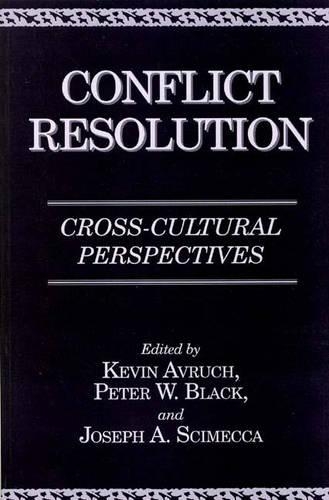
Conflict Resolution: Cross-Cultural Perspectives
(Paperback)
Publishing Details
Conflict Resolution: Cross-Cultural Perspectives
By (Author) Kevin Avruch
By (author) Peter W. Black
By (author) Joseph A. Scimecca
Bloomsbury Publishing PLC
Praeger Publishers Inc
23rd July 1998
United States
Classifications
Tertiary Education
Non Fiction
303.69
Physical Properties
Paperback
256
Width 156mm, Height 235mm
397g
Description
This collection of comparable case studies addresses the need to assess modes of conflict resolution in a larger sociocultural context with attention to varying approaches and cultural perspectives. Editors Avruch, Black, and Scimecca, together with other anthropologists and sociologists, propose and test different propositions, while looking toward a general theory of conflict and conflict resolution. Their joint effort should be of interest to sociologists, anthropologists, political scientists, indeed to all those concerned with ethnic studies and ethnoconflict today. The contributors examine different theoretical concepts and approaches to conflict resolution in five different cultures - American, Arab, Asian, Latin American, and Pacific societies. The interdisciplinary study offers a broad range of vantage points for considering interpersonal, community, institutional, and national problems. The authors analyze concepts of personhood, the role of power and authority, ethical values, and methods for negotiating differences, and conflict resolution as an emerging discipline.
Reviews
The papers are of a uniformly high quality, and group together well. The volume will help to advance a perspective widely held by legal anthropologists and by scholars in law and society studies. It should alert conflict-resolution practitioners to the importance of studying culture.-American Anthropologist
Whether we speak of the 'science' or 'art' of the 'resolution' or 'management' of conflict, it is increasingly clear that differences among persons and groups cannot and should not always be left to be acted out by the dissenting parties or subjected to judicial litigation. In fact, the very ideas that individuals are autonomous in crucial ways, and that a judge or jury is important to assure rational decisionmaking, are culturally imbedded attitudes and values rather than objective parameters of universal social relationships. Most of this book contains case studies of how various 'non-Western nonindustrial societies resolve or fail to resolve their own internal conflicts' (p.ix). The history of 'alternative dispute resolution' and its recent emergence in the US are traced; 'harmony' and 'confrontational' models of law are contrasted cross-culturally; and case studies cover British academia, Lebanese managers, the Dou Donggo of Indonesia, Tobi, Micronesia, urban Costa Rica, Solomon Islands, and Hawaii. Emphasis on the cultural construction of personhood, the 'moral economy' (p.10) of a community, and the views of the participants, in this culturally relative approach are valuable in affording genuine insight into a variety of modes of conflict resolution, many of which appear to be socially and psychologically less stressful and more rewarding than the dominant adversarial model. Community-college level and up.-Choice
"The papers are of a uniformly high quality, and group together well. The volume will help to advance a perspective widely held by legal anthropologists and by scholars in law and society studies. It should alert conflict-resolution practitioners to the importance of studying culture."-American Anthropologist
"Whether we speak of the 'science' or 'art' of the 'resolution' or 'management' of conflict, it is increasingly clear that differences among persons and groups cannot and should not always be left to be acted out by the dissenting parties or subjected to judicial litigation. In fact, the very ideas that individuals are autonomous in crucial ways, and that a judge or jury is important to assure rational decisionmaking, are culturally imbedded attitudes and values rather than objective parameters of universal social relationships. Most of this book contains case studies of how various 'non-Western nonindustrial societies resolve or fail to resolve their own internal conflicts' (p.ix). The history of 'alternative dispute resolution' and its recent emergence in the US are traced; 'harmony' and 'confrontational' models of law are contrasted cross-culturally; and case studies cover British academia, Lebanese managers, the Dou Donggo of Indonesia, Tobi, Micronesia, urban Costa Rica, Solomon Islands, and Hawaii. Emphasis on the cultural construction of personhood, the 'moral economy' (p.10) of a community, and the views of the participants, in this culturally relative approach are valuable in affording genuine insight into a variety of modes of conflict resolution, many of which appear to be socially and psychologically less stressful and more rewarding than the dominant adversarial model. Community-college level and up."-Choice
Author Bio
KEVIN AVRUCH is Professor of Anthropology and a member of the Faculty Advisory Board of the Institute for Conflict Analysis and Resolution, at George Mason University. He has published widely on ethnicity, politics, and religion in Israel and the Middle East and, with Peter W. Black, on culture and conflict resolution. He is the author of Culture and Conflict Resolution (USIP Press, 1998). PETER W. BLACK is Professor of Anthropology and a member of the Faculty Advisory Board of the Institute for Conflict Analysis and Resolution, at George Mason University. He is a specialist on Oceania and has published numerous articles on religion, ethno-psychology, dispute behavior and, with Kevin Avruch, on culture and conflict resolution. JOSEPH A. SCIMECCA is Professor of Sociology at George Mason University. He is Chair of the Department of Sociology and Anthropology and formerly Director of the Center for Conflict Analysis and Resolution. His main areas of research are sociological theory, conflict resolution, and public policy. He is currently completing a book entitled Counsel of the Wicked.
